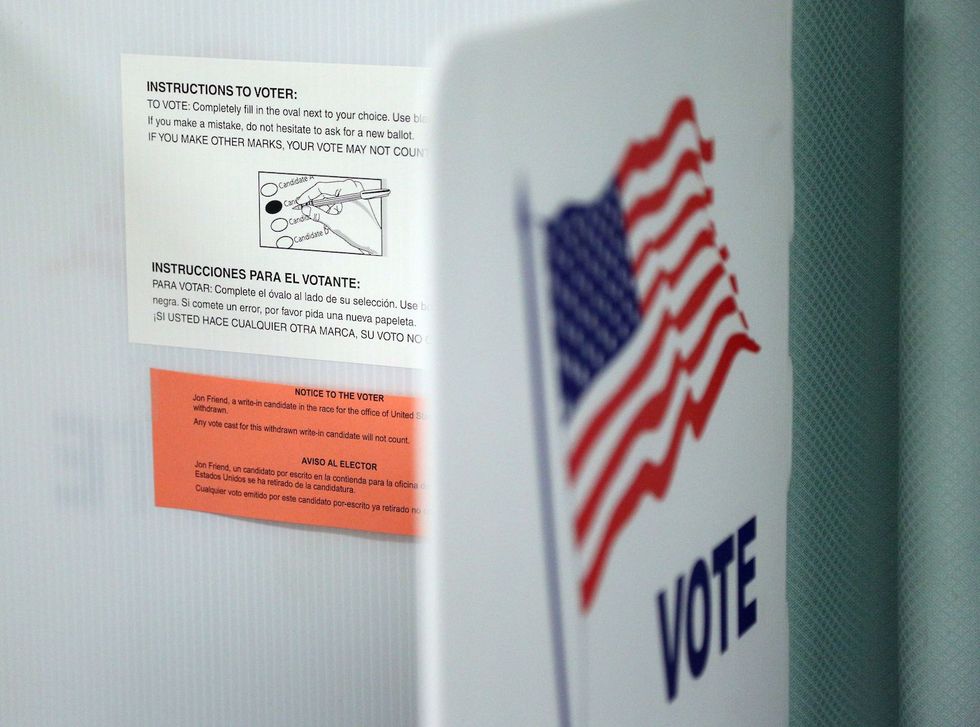
Instructions in both English and Spanish on how to vote are affixed to a booth inside a polling station in Christmas, Florida prior to the arrival of voters on election day, on November 8, 2016.(GREGG NEWTON/AFP/Getty Images)

Convicted felons in Florida could have their voting rights restored automatically upon completion of their sentences if a proposal passes this November.
Floridians for Fair Democracy gathered the required 766,200 signatures required to get a proposal on the ballot that would restore voting rights to convicted felons automatically once they’ve completed their sentences.
Currently, felons can petition for clemency once their sentences are complete, but only a few hundred petitions per year are approved due to tighter restrictions implemented by Florida Gov. Rick Scott and other state Republicans.
The proposal must receive 60 percent of the vote to pass. It excludes convicted murderers or sexual criminals, who would still have to petition for their right to vote to be restored.
Permanent disenfranchisement of felons in Florida dates back to 1868. At the time it was enacted, the state also created a number of new felony crimes and expanded the list of crimes that would disqualify one from being able to vote.
Some of the controversy surrounding the provision relates to the historical climate from which it was born. Slaves had just been freed in 1865, and in 1865 and 1866 a series of laws were enacted by the Florida legislature aimed at expanding the criminal justice system in a way that disproportionately affected African Americans. Florida’s significant freedman population during Reconstruction led to fears of minority upheaval in state and local government.
The impact of those laws has endured over the years. From a report by the U.S. Commission on Civil Rights, evaluating the 2000 presidential election:
“The state’s aggressive purging laws, policies and practices disproportionately affect African Americans, who are disproportionately charged, convicted and sentenced in the criminal justice system.”
While the origins of the provision may be steeped in slavery and racial politics, data collected by the Sentencing Project shows that three out of four Floridians who have lost their voting rights due to a felony conviction are white.
“Dems want to restore the felon vote because they think they will benefit; Republicans want to restrict felon voting because they believe they will be harmed,” said former University of South Florida professor Darryl Paulson, who is a fellow at the conservative Heritage Foundation. “Most felons are nonviolent and deserve to have their rights restored. Most felons in Florida are white, not black. If conservatives want to end recidivism and reintegrate felons into society, the restoration of voting rights is essential.”
Opponents of restoring the vote to ex-felons cite the likelihood of felons to return to prison and a demonstrated lack of respect for the rule of law as reasons ex-felons should not be given the right to vote automatically.
“If you’re not willing to follow the law, then you can’t have the right to make the law for everyone else,” said Roger Clegg, president and general counsel for the Center for Equal Opportunity. “It doesn’t make sense to have automatic restoration of rights, because most people who walk out of prison are going to walk back in anyways.”
About one out of four Florida inmates returns to prison within three years of release.
Concerns on both sides about the political impact of restoring the vote to convicted felons explains why this has remained a contentious issue for decades.
The 2000 presidential election serves as a useful example of the potential significance of 1.5 million Floridians suddenly being allowed to vote. A 2002 study estimates that if Florida’s former felons had been allowed to vote in 2000 and turned out at a 13 percent rate, 31,000 additional votes would have been cast. Former president George W. Bush won by 537 votes.
Florida is just one of four states that still permanently bans ex-felons from voting.